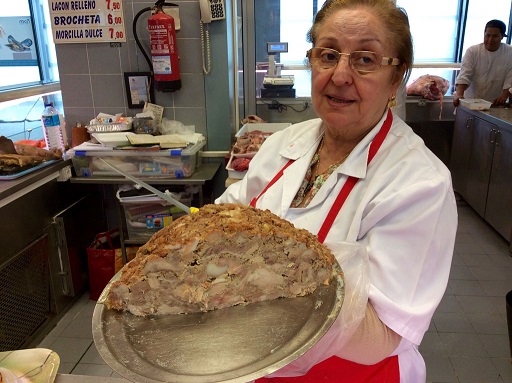 Chicharrones, roxóns, roxós, roxois, rinxóns or rinchóns, all different names for the same thing depending on the area, are the fatty, lower quality cuts of pork cut into chunks and gently boiled down till you get a shredded sort of texture. They are a typical and much loved tapa in the northern part of Galicia. Purists in the matter generally frown upon any kind of spicing so what follows is a very traditional recipe. Bear in mind it takes 2kg/4lbs of meat to make just 1kg/2lbs of Roxóns.
Chicharrones, roxóns, roxós, roxois, rinxóns or rinchóns, all different names for the same thing depending on the area, are the fatty, lower quality cuts of pork cut into chunks and gently boiled down till you get a shredded sort of texture. They are a typical and much loved tapa in the northern part of Galicia. Purists in the matter generally frown upon any kind of spicing so what follows is a very traditional recipe. Bear in mind it takes 2kg/4lbs of meat to make just 1kg/2lbs of Roxóns.
INGREDIENTS
2kg/4lbs of fatty pork cuts like shoulder (1.5kg) and belly (500gr).
1,5 tbsp of course salt
125ml/1/4 pint of cold water.
METHOD
People here like to stew the meat in ‘tiras’ or strips preferring the fat left on. The more health conscious among us can trim the fat off in large enough pieces so they can be removed before we get to the pressing stage. Although in recent decades we’ve been taught to despise it, fat provides all important flavour in many of the great stews of northern Spain such as cocido, fabada etc.
Bring the meat, water and salt to the boil in a deep saucepan and then reduce to a simmer, stirring frequently with a wooden spoon. Extra water is rarely added as the fat melts and that in turn helps to break down the meat. The total cooking time will be approximately an hour and a half to two hours on a very low heat, after which you’ll transfer the roxóns to a bowl shaped metal colander or strainer placed over a saucepan in order to drain off the excess fat. Press the roxóns down with the help of a plate and then something weighty like a unopened carton of milk.
Once all the fat has drained off, allow them to cool and in the process the roxóns will have molded themselves very nicely into the colander. All you have to do now is turn them onto a plate and that’s it. Roxóns are generally served cold with cured embutidos like jamón, chorizo, cecina (cured beef) though you can also warm them up if you like. They’re excellent in warm crusty bread and my choice of wine to accompany them would be a young, fruity red such as a Mencía from the Ribeira Sacra, though a crisp, lightly chilled Ribeiro or Rias Baixas Albariño works just as well, come to think of it.
The fat that semi-solidifies in the saucepan after pressing can be scraped out and then spooned into airtight jars to keep in the refridgerator. It’s a superb flavouring agent in casseroles and stews. Roxóns are not something we should eat week in week out, but every once in a while they’re an excellent and very Galician addition to your tapas repertoire, along with the shop bought jamón, chorizo, salchichón, cheese and other delights.







Your means of explaining all in this article is truly fastidious,
all be capable of easily know it, Thanks a
lot.